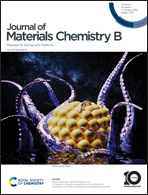Biomimetic dual-responsive bioengineered nanotheranostics for intracellular cascade-synthesizing chemo-drugs and efficient oncotherapy†
Abstract
Intracellular-synthesized chemo-drugs based on the inherent characteristics of the tumor microenvironment (TME) have been extensively applied in oncotherapy. However, combining other therapeutic strategies to convert nontoxic small molecules into toxic small-molecule chemo-drugs in the TME is still a huge challenge. To address this issue, herein we have developed a biomimetic dual-responsive bioengineered nanotheranostics system via the supramolecular co-assembly of the nontoxic small-molecule 1,5-dihydroxynaphthalene (DHN) and small-molecule photosensitizer indocyanine green (ICG) followed by surface cloaking through red blood cell membranes (RBCs) for intracellular cascade-synthesizing chemo-drugs and efficient oncotherapy. Such nanotheranostics with a suitable diameter, core–shell structure, ultrahigh dual-drug payload rate, and excellent stability can efficiently accumulate in tumor regions and then internalize into tumor cells. Under the dual stimulations of near-infrared laser irradiation and acidic lysosomes, the nanotheranostics system exhibited exceptional instability under heat-primed membrane rupture and pH decrease, thereby achieving rapid disassembly and on-demand drug release. Furthermore, the released ICG can efficiently convert 3O2 into 1O2. After that, the generated 1O2 can efficiently oxidize the released nontoxic DHN into the highly toxic chemo-drug juglone, thereby realizing intracellular cascade-synthesizing chemo-drugs and synergistic photodynamic-chemotherapy while reducing detrimental side effects on normal cells or tissues. Overall, it is envisioned that RBC-cloaked nanotheranostics with intracellular cascade-synthesizing chemo-drugs can provide a promising strategy for intracellular chemo-drug synthesis–based oncotherapy.



 Please wait while we load your content...
Please wait while we load your content...